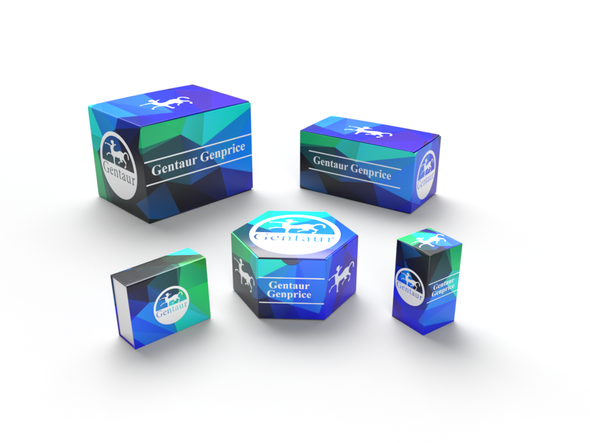749
Human Phosphatidylinositol-glycan biosynthesis class F protein (PIGF) ELISA Kit | KTE61212
- SKU:
- 749-KTE61212
- Availability:
- Usually ships in 5 working days
Description
Human Phosphatidylinositol-glycan biosynthesis class F protein (PIGF) ELISA Kit | KTE61212 | Gentaur UK, US & Europe Distribution
Application: This Human Phosphatidylinositol-glycan biosynthesis class F protein (PIGF) ELISA Kit employs a two-site sandwich ELISA to quantitate PIGF in samples. An antibody specific for PIGF has been pre-coated onto a microplate. Standards and samples are pipetted into the wells and anyPIGF present is bound by the immobilized antibody. After removing any unbound substances, a biotin-conjugated antibody specific for PIGF is added to the wells. After washing, Streptavidin conjugated Horseradish Peroxidase (HRP) is added to the wells. Following a wash to remove any unbound avidin-enzyme reagent, a substrate solution is added to the wells and color develops in proportion to the amount of PIGF bound in the initial step. The color development is stopped and the intensity of the color is measured.
Detection Method: Colorimetric
Conjugate: N/A
Sample Type: Cell culture supernatants#Serum#Plasma#Other biological fluids
Assay Type: Multiple steps standard sandwich ELISA assay with a working time of 3-5 hours. It depends on the experience of the operation person.
Kit Component: • Human Phosphatidylinositol-glycan biosynthesis class F protein microplate
• Human Phosphatidylinositol-glycan biosynthesis class F protein standard
• Human Phosphatidylinositol-glycan biosynthesis class F protein detect antibody
• Streptavidin-HRP
• Standard diluent
• Assay buffer
• HRP substrate
• Stop solution
• Wash buffer
• Plate covers
Features & Benefits: Human Phosphatidylinositol-glycan biosynthesis class F protein (PIGF) ELISA Kit has high sensitivity and excellent specificity for detection of Human PIGF. No significant cross-reactivity or interference between Human PIGF and analogues was observed.
Calibration Range: Please inquire
Limit Of Detection: Please inquire
Usage Note: • Do not mix components from different kit lots or use reagents beyond the kit expiration date.
• Allow all reagents to warm to room temperature for at least 30 minutes before opening.
• Pre-rinse the pipet tip with reagent, use fresh pipet tips for each sample, standard and reagent to avoid contamination.
• Unused wells must be kept desiccated at 4 °C in the sealed bag provided.
• Mix Thoroughly is very important for the result. It is recommended using low frequency oscillator or slight hand shaking every 10 minutes.
• It is recommended that all samples and standards be assayed in duplicate or triplicate.
Storage Instruction: The unopened kit should be stored at 2 - 8°C. After opening, please store refer to protocols.
Shipping: Gel pack with blue ice.
Precaution The product listed herein is for research use only and is not intended for use in human or clinical diagnosis. Suggested applications of our products are not recommendations to use our products in violation of any patent or as a license. We cannot be responsible for patent infringements or other violations that may occur with the use of this product.
Background: PIGF encodes 1 of the enzymes involved in glycosylphosphatidylinositol (GPI) anchor biosynthesis. The primary biochemical defect in paroxysmal nocturnal hemoglobinuria (PNH), an acquired hematologic disorder with protean clinical manifestations including recurrent episodes of hemolysis, infections, and venous thrombosis, involves defective synthesis of GPI anchors that attach certain proteins to the cell surface membrane. Proteins with appropriate C-terminal signal peptides are transferred to the preformed glycolipid anchor in the endoplasmic reticulum and transported to the cell surface as a single unit; in PNH, there is a defect in GPI-anchor biosynthesis and an absence of all surface proteins that use this anchoring motif.
Alternative Names: PIGF; MGC32646; MGC33136;
Search name: PIGF; MGC32646; MGC33136;
Tag: PIGF










